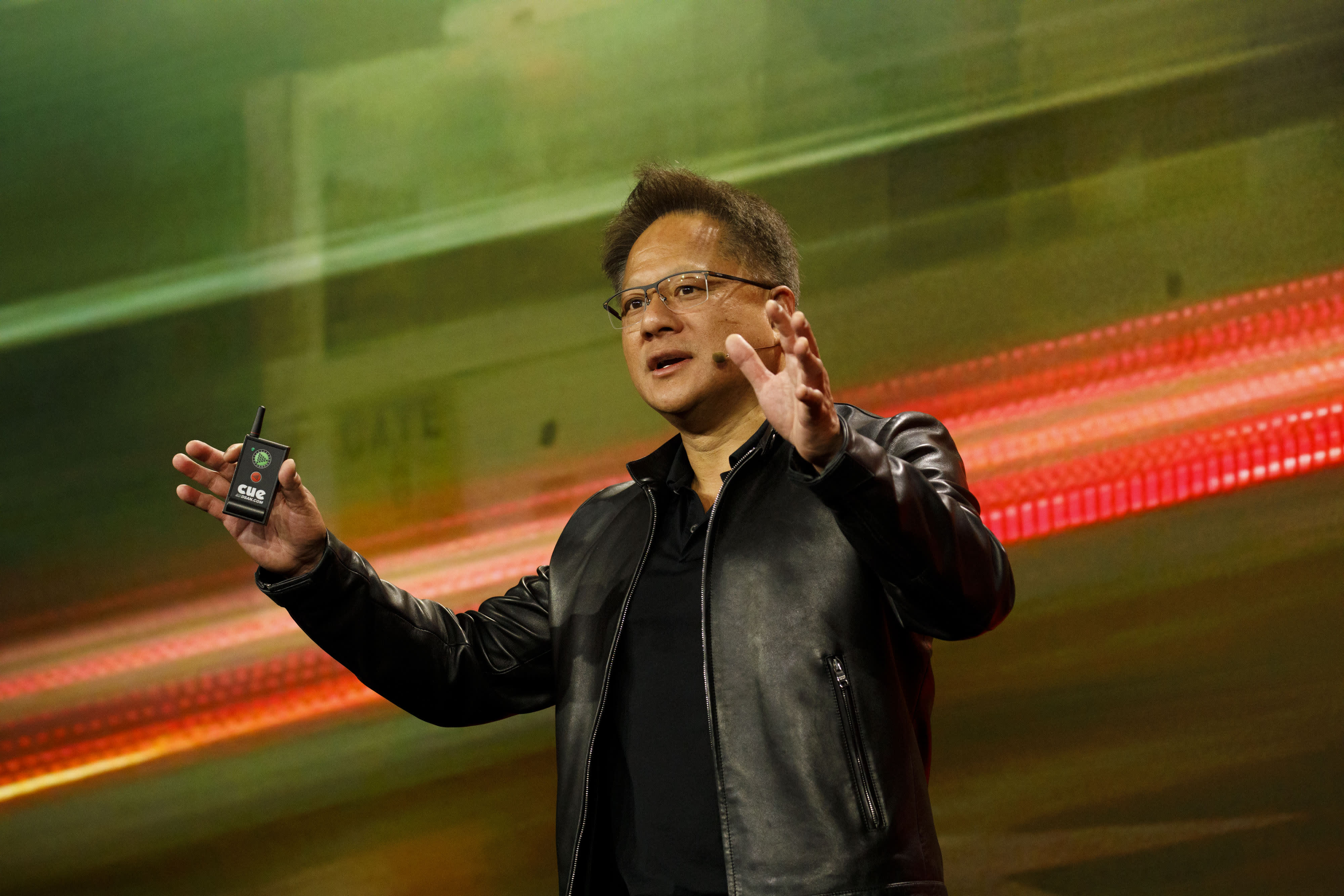Microsoft-backed Graphcore calls on UK regulator to block Nvidia’s Arm acquisition

Jen-Hsun Huang, president and chief executive officer of Nvidia Corp., speaks during the company’s event at Mobile World Congress Americas in Los Angeles, California, U.S., on Monday, Oct. 21, 2019.
Patrick T. Fallon | Bloomberg | Getty Images
LONDON — Microsoft-backed Graphcore has objected to Nvidia‘s $40 billion acquisition of Arm Holdings, according to a co-founder of the British chipmaker, citing competition concerns.
Hermann Hauser, who helped to create Arm in 1990, told CNBC that Graphcore has opposed the deal in a “major submission” to the U.K.’s Competition and Markets Authority. Arm was spun out of an early computing company called Acorn Computers, which Hauser co-founded in Cambridge in 1978.
“If Nvidia can merge the Arm and Nvidia designs in the same software then that locks out companies like Graphcore from entering the seller market and entering a close relationship with Arm,” said Hauser, who is an investor in Graphcore through his venture capital firm Amadeus Capital.
A spokesperson for Nvidia, which is planning to buy Arm from Japanese tech giant SoftBank, described the deal as “pro-competitive” on Wednesday. Arm did not immediately respond to a CNBC request for comment.
Graphcore and the CMA declined to comment. However, Graphcore CEO Nigel Toon told CNBC in December that Graphcore views the deal as anti-competitive. “It risks closing down or limiting other companies’ access to leading edge CPU processor designs which are so important across the technology world, from data centers, to mobile, to cars and in embedded devices of every kind,” he said.
Arm licenses its chip designs to over 500 firms around the world and Hauser calls it the “Switzerland of the semiconductor industry” because it is very “even-handed” in the way that it deals with its licensees. Arm’s energy-efficient chip architectures are used in 95% of the world’s smartphones and 95% of the chips designed in China. Hauser is concerned that Nvidia will destroy Arm’s business model by closing off access to the company’s chip designs.
A spokesperson for Nvidia insisted that the company will maintain Arm’s open license model. “Arm CPUs (central processing units) will continue to work with all peripherals and accelerators, just as they do now, and customers will be able to integrate Arm designs with their own accelerators, just as they can today,” they said. “We’re confident that regulators will see the benefits to the entire tech ecosystem.”
Hauser said Nvidia is “lying through their teeth” when it promises to keep Arm’s business model.
An Nvidia spokesperson said: “We are discussing our plans with the U.K. government, and we are very happy to put legally binding agreements behind all our commitments.”
Hauser, a Cambridge-based entrepreneur turned investor — who spoke to CNBC from his farm in New Zealand via Zoom this week — has publicly criticized the deal ever since it was announced last September, calling it a disaster for Arm’s home city of Cambridge, as well as the U.K. and Europe.
“If you think about the situation Nvidia is in, Nvidia is the one company that would profit from spending $40 billion on destroying a company,” said Hauser, who no longer has any shares in Arm.
When announcing the acquisition, Nvidia and Arm said the deal will create the world’s “premier computing company for the age of AI.” The duo have pledged to keep Arm in Cambridge and invest heavily in the business.
“This combination has tremendous benefits for both companies, our customers, and the industry,” said Nvidia CEO Jensen Huang when the deal was announced.
Widespread opposition
Graphcore isn’t the only tech firm that has objected to the transaction. Local chipmakers in China including Huawei have urged Beijing to try to block the deal over fears that they could be at a disadvantage if Arm ends up in the hands of a U.S. company.
The deal is now being investigated by regulators around the world. The EU and the U.K. are set to open “in-depth competition investigations” into the deal, according to a report from The Financial Times on Thursday.
Two tech investors told CNBC last October that they think the deal will be derailed by regulators and Hauser believes the chance of the deal being blocked is now higher than 50%.
Graphcore was founded in June 2016 in Bristol, England, by Toon and Simon Knowles, who sold their previous chip company, Icera, to Nvidia for $435 million in 2011. The pair formed the initial idea for Graphcore in a small pub called the Marlborough Tavern in Bath in January 2012.
Since it was founded, Graphcore has raised $750 million for its new processors which are designed to power artificial intelligence software. The company calls them intelligence processing units, or IPUs.
Investors include the likes of Microsoft and BMW iVentures, as well as venture firms like London’s Atomico and Silicon Valley’s Sequoia, which has also backed Nvidia.
In November, Sequoia partner Matt Miller told CNBC: “I don’t think that you have to take on Nvidia because the market is so huge. Taking on Nvidia is like this huge task. It’s a huge company with billions of revenue and incredible teams doing all sorts of wonderful things.”
He added: “I think that what Graphcore has the opportunity to do is be a very strong player in the AI microprocessor market. It continues to have great progress with many of the cloud providers, and many people want to be diversified. They don’t want to be all in with one chip.”